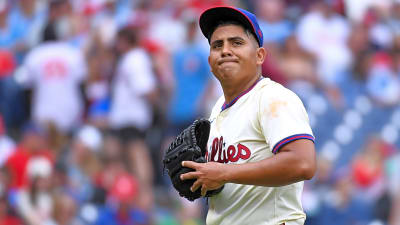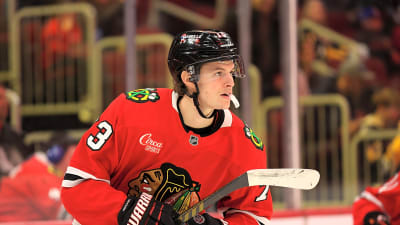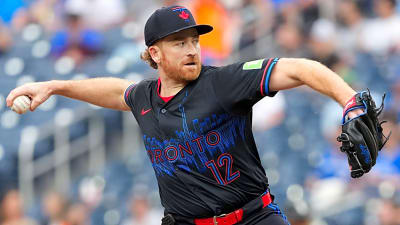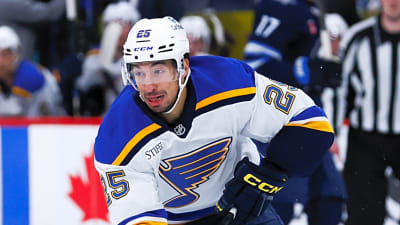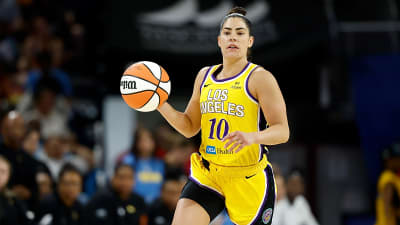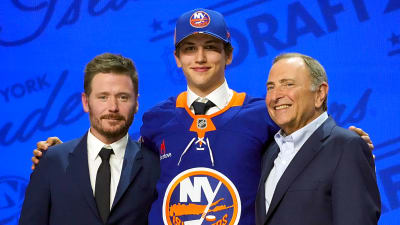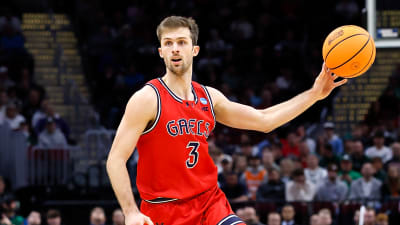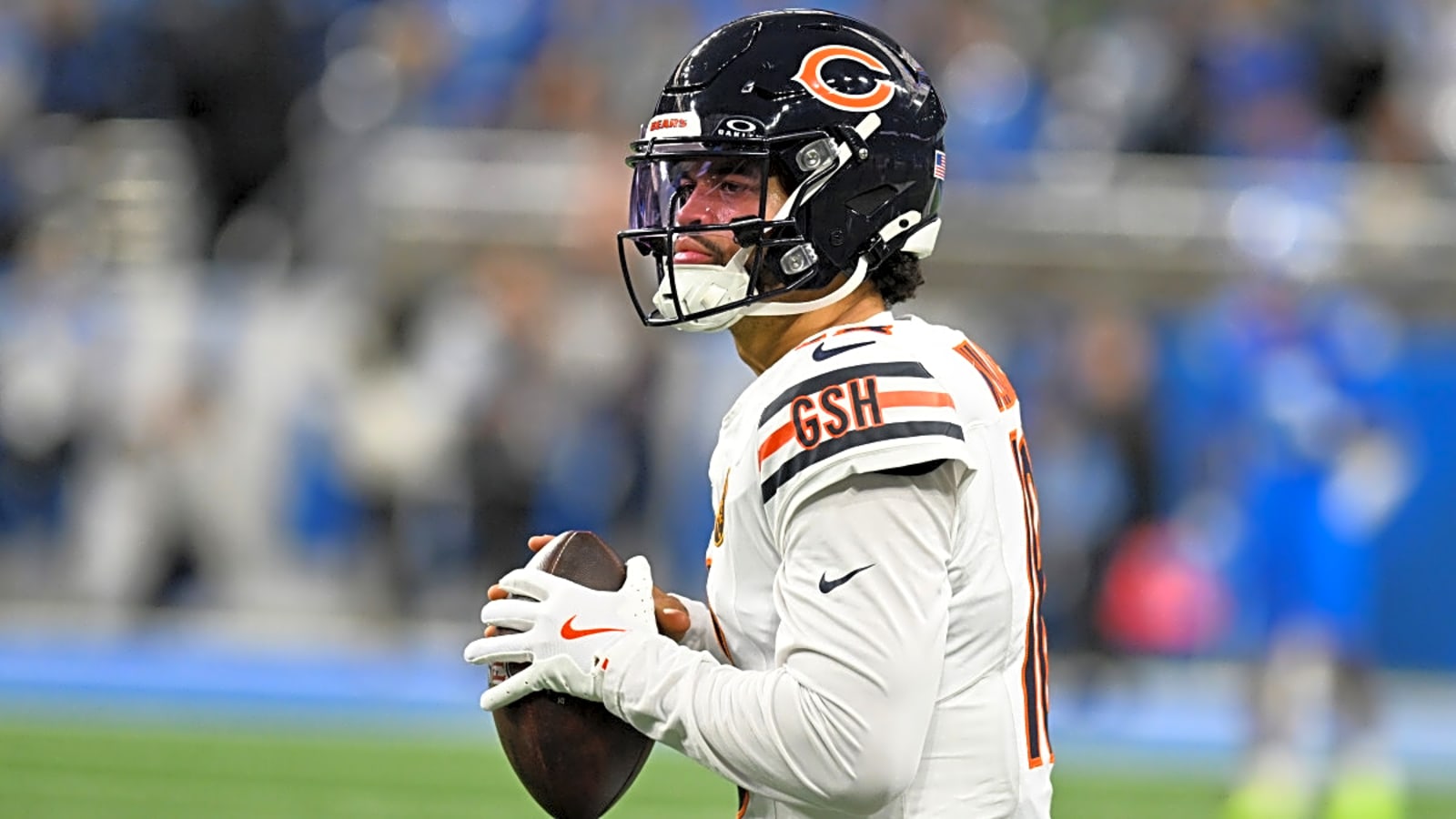
There needs to be a term for the amount of scrutiny a player like Caleb Williams is getting as he prepares for his second season as the signal caller for the Chicago Bears. While his contemporaries are still receiving the benefit of the doubt, Williams finds himself firmly under the microscope as the Bears don a new look under head coach Ben Johnson and a litany of staff changes.
PFF unveiled a new article offering a floor and ceiling for every 2024 quarterback drafted in the first round. Of the six second-year quarterbacks profiled, Williams was the only one whose floor was an outright "bust" and whose ceiling was, curiously, Jordan Love. It's curious not because it could have been a comparison meant only to generate clicks, but because the two couldn't be further apart when it comes to player profiles. Love is a gunslinger who prefers attacking downfield and isn't shy about throwing an interception. In contrast, Williams relies on attacking the intermediate areas of the field, using his feet to create space, and has shown an impressive ability to avoid turnovers.
Look, I'm a Bears fan, so I'll approach this with a level of bias, but I'm being gaslit by a vast majority of the media when it comes to the talent and potential of Caleb Williams.
A Tale of Two Narratives
Williams had his struggles, and he needs to get quicker when it comes time to throw the ball, but I feel that his season was borderline miraculous when considering the dysfunction surrounding him at every turn.
It started with the first of three offensive coordinators, Shane Waldron, implementing an offense that was the NFL equivalent of a "choose your own adventure" book—a head coach whose staff didn't watch film with its franchise quarterback. A year that saw the Bears do something they've never done before: fire a head coach mid-season.
And through it all, Williams kept showing up. Kept extending plays. Kept his eyes downfield. Kept getting up off the turf after another blown protection or dropped pass. Yet somehow, he's the only quarterback in his class being treated like he's on borrowed time.
Let's be honest, if Williams had done exactly what he did in a more "stable" organization (read: anywhere else besides Chicago), the national narrative would be flipped. They'd be calling him the second coming. Instead, because he landed in the historically cursed Bermuda Triangle of quarterback development that's Chicago, people are already sharpening their "he's not that guy" takes as if it's a preemptive victory lap.
Meanwhile, Anthony Richardson plays 2.5 games and gets a documentary. Bryce Young gets a coaching mulligan and a roster reset. Even Will Levis gets the "sleeper breakout" treatment.
But Caleb Williams?
He gets a "bust floor" and a Jordan Love ceiling. It's doubly maddening when you look across state lines and see JJ McCarthy, who has never played an NFL snap or eclipsed 3,000 yards in college, get a Sam Darnold floor (who got MVP votes, mind you!) and Joe Burrow ceiling.
The bar for Caleb isn't just higher — it's orbiting Earth.
And maybe that's the real problem: when a player has been under the microscope since high school, people stop evaluating his game and start evaluating the myth. They're not watching tape — they're watching narrative. And that's how you end up with a 22-year-old quarterback already branded polarizing for… existing?
And yet, despite the chaos, Caleb quietly stacked a rookie season that would've had any other fanbase doing cartwheels. He threw for 3,541 yards, ran for another 489, and accounted for over 4,000 total yards. His 20-to-6 touchdown-to-interception ratio was among the most efficient of all rookie signal-callers, and he led his peers in total offense despite playing behind a bottom-tier O-line with a playbook that felt like it was written during a fever dream. He avoided turnovers, extended plays, and kept the Bears competitive in games they had no business being in. And for all the noise about his decision-making? He had the lowest turnover-worthy play rate of the group. But you wouldn't know any of that from the headlines, because when you're Caleb Williams, the standard isn't just excellence. It's perfection.
What Caleb is experiencing isn't just criticism — it's something more profound. It's what I'm calling 'hype inversion': when a player is so relentlessly hyped and so obsessively analyzed that the narrative bends back on itself. The spotlight becomes a magnifying glass, and suddenly, nothing they do is good enough. Every throw is either expected or overrated. Every flaw becomes fatal. And before they've even had a chance to grow, the conversation has already turned from "superstar in the making" to "prove you're worth it." That's where Caleb is — not because he's failed, but because the hype machine has eaten itself alive.
The Future of Caleb Williams
So, where does that leave us?
With a quarterback who's done more with less than almost anyone in his class, being judged more harshly than all of them. Caleb Williams isn't fighting to prove he belongs — he's fighting to reclaim a narrative that was hijacked before his first NFL snap.
That's the cruel irony of hype inversion: The more promise you show, the faster people rush to bury it. But narratives don't win games — talent does. And if his rookie season was Williams' floor, then buckle up. Because when the dust settles and the noise fades, we may look back and realize the most scrutinized quarterback in the league was the one we all slept on.
More must-reads:
- Broncos' Patrick Surtain II reveals his 'main goal' after winning 2024 DPOY
- Jets' Breece Hall makes feelings about Steelers' Aaron Rodgers clear
- The 'NFL head coaches' quiz
Breaking News
Trending News
Customize Your Newsletter
 +
+
Get the latest news and rumors, customized to your favorite sports and teams. Emailed daily. Always free!

